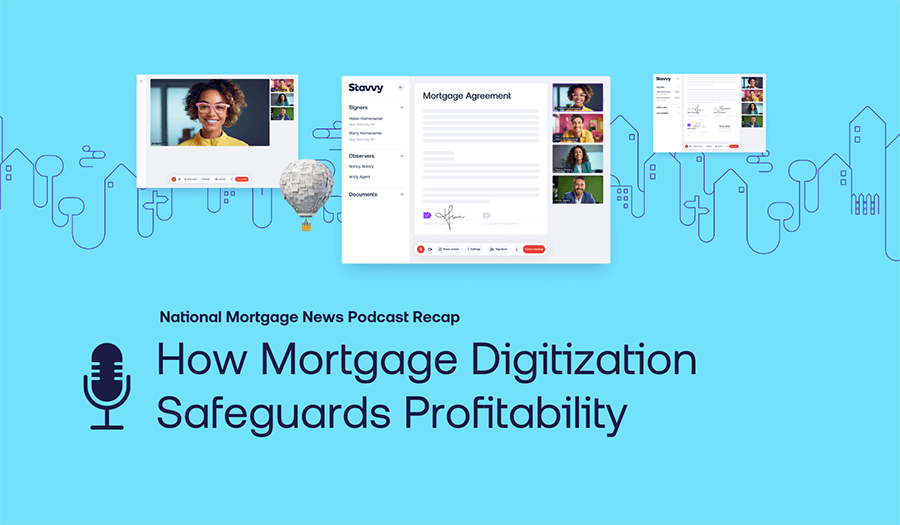Last week, Stavvy had the pleasure of participating in a panel on “Remote Online Notarization (RON) and the future of eClosings” at the summer 2021 Minnesota Land Title Association Summit in St. Paul, MN.
Amy Tankersly and Alex Grundhoffer, both from Doma, joined Stavvy to discuss the benefits of RON, its current status in Minnesota and beyond, and what lies ahead for mortgage eClosings.
What is remote online notarization (RON)?
Notarization is an important component of large financial transactions, and is especially important for real estate and mortgage transactions. Notarization is essentially an anti-fraud measure, in which a notary verifies the identity of the parties involved in a transaction, witnesses the transaction and signatures in person (traditionally), and ensures that each party is acting in their best interests without outside interference. Once signed, the document is notarized, stamped or sealed, and is then legally binding.
Remote online notarization removes the in-person requirement, replacing a personal appearance with encrypted real-time audio and video communication and applying electronic signatures and notarial seals in place of paper and pen signatures. Transactions that once required onerous in-person meetings with a stack of papers to sign with “wet ink” can now be executed online from wherever each party prefers. For the mortgage lending industry, this represents a huge opportunity to provide consumers with a better, easier, more secure process from start to finish.
RON in Minnesota and Beyond
There are now 37 states that currently allow remote online notarization, with bills introduced in many of the remaining states to legalize RON. There’s also federal legislation that would set up a uniform framework for RON that is making its way through Congress. Minnesota passed its RON law in 2019.
While RON is legal in more than two thirds of the country, lenders and related organizations have been slow to adopt the technology. Mortgages and related loan transactions have been conducted the same way for decades, and digitizing the process can be painstaking. However, today -- especially in the wake of the COVID-19 pandemic -- consumers expect to be able to conduct important business like a loan transaction safely from anywhere. Barriers to that experience will turn consumers away and leave them searching for lenders and other partners that allow them to feel comfortable.
The Future of RON and eClosings
It’s up to lenders, title companies, and related parties to adopt modern solutions that will help realize the elusive better borrower experience that has been promised but never fully attained. At Stavvy, we have heard pushback from those both inside and outside the industry about the digitization of the mortgage process. Misconceptions abound, ranging from a lack of fraud controls and security measures to perceptions of a cumbersome and complex process.
As we look to the future of RON and digital closings, adoption success hinges on four key areas: simplicity, collaboration, validation, and security. From an adoption standpoint, no one involved in the process will change if they have to significantly alter how they operate or take additional steps to complete the transaction. We often note that our biggest competitor isn’t other technologies -- it is paper and the status quo. Second, the technology has to make it easier for all parties in the transaction to collaborate and work together.
The loan manufacturing process is fragmented and broken, requiring multiple touch points with a myriad of providers. Success occurs when all of these parties can seamlessly exchange information and trust the data being provided. To that end, we also have to take advantage of the benefits the technology provides to both establish process controls and create trust in the data, not just at the time of the closing but for all downstream parties through the life of the loan. Finally, data and consumer privacy and security are essential. Recent data breaches and ransomware attacks highlight the importance of building in security controls at the start.
Stavvy may be a startup, but our leadership team has a collective century’s worth of experience, not just in mortgage origination and servicing, but also data privacy and computer security. RON is the future. Digital loan origination and servicing are here to stay. The question we always ask our prospective customers and partners is: are you going to help lead the way?



![[Webinar Recap] Advancing Your Digital Default Servicing Strategy](https://blog.stavvy.com/hubfs/advancing-your-digital-default-servicing-strategy-blog-recap.png)